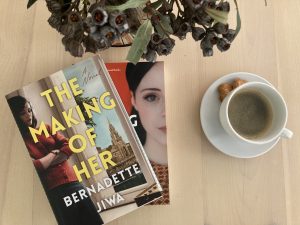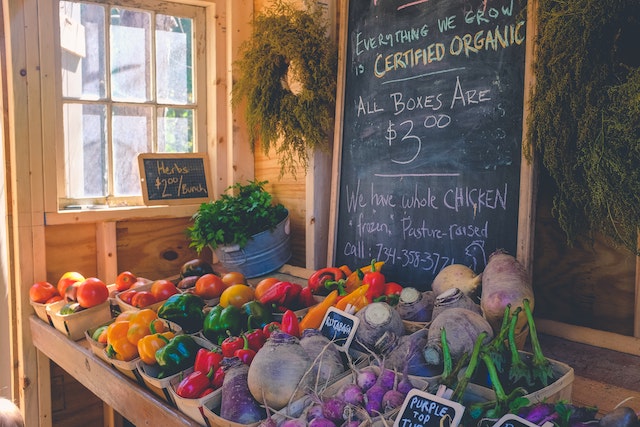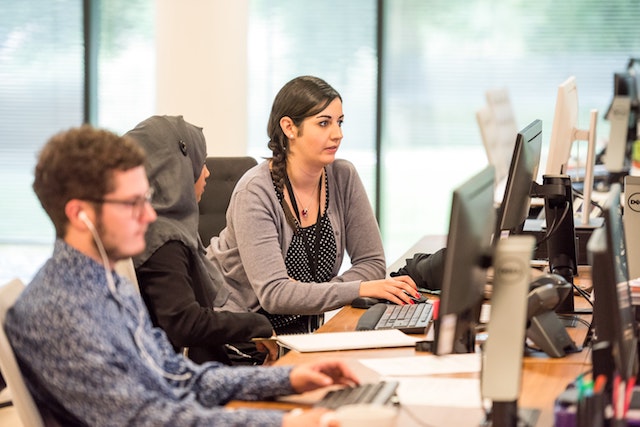Unlock the Magic in Your Story Now
Get the Free 20 questions to Ask Before Launching Your Idea workbook when you sign up for occasional updates.
Get the Free 20 questions to Ask Before Launching Your Idea workbook when you sign up for occasional updates.
Articles filed in: Meaningful Work
Creativity Is A Journey
filed in Creativity, Meaningful Work, Storytelling
 Eleven years ago, I discovered blogging. Inspired by my clients’ stories and their questions, I began posting weekly, then daily for a while. I hadn’t written for an audience since I left school more than thirty years before. Nobody was more surprised than I was to discover that people wanted to read what I wrote here and in the books that followed.
Eleven years ago, I discovered blogging. Inspired by my clients’ stories and their questions, I began posting weekly, then daily for a while. I hadn’t written for an audience since I left school more than thirty years before. Nobody was more surprised than I was to discover that people wanted to read what I wrote here and in the books that followed.
Fast forward to 2019, when I decided it was finally time to follow my heart and begin writing my debut novel set in Dublin. And today, I’m thrilled to share it with you. The Making of Her publishes in the U.S. today and is available through all great bookstores. The Australian edition was published in May with an equally gorgeous cover.
You can hear a sample of Aoife McMahon’s brilliant audiobook performance here.
If I hadn’t spent a decade blogging, I wouldn’t have had the courage to begin writing a novel. I have every reader who subscribed to, read and shared my blog to thank for showing me that creativity is a journey, not a destination.
A Stake In The Ground
filed in Meaningful Work, Strategy, Success

Years ago, when the owner of our local bakery decided to bake only gluten-free bread and cakes, it would have sounded like a risky strategy. Many people would have advised her to sell both conventional baked goods alongside her gluten-free loaves. Instead, she put a stake in the ground.
We are naturally inclined to want to hedge our bets. But it can be liberating to say this is the real work I care about doing. These are the exact people I want to serve.
Those decisions about what’s important to us and how to do our best work can mean the difference between standing out and fitting in. Joy and misery. Success and failure.
Whatever work you do, it’s helpful to reflect on who you want to be to whom.
Image by Maranda Vandergriff
Expect The Good
filed in Meaningful Work, Strategy, Worldview

There is no way of knowing if the organic vegetables I bought today were grown without pesticides. But I trust that they were.
When I order gluten-free bread for a friend, I trust my baker has used the right flour.
I believe the chocolate inside the bar labelled ‘fair trade’ is ethically produced.
Every day we rely on millions of people we’ve never met to tell the truth and do the right thing. And they do.
Our culture and our society depend on us expecting the good. And we do.
Image by Neonbrand
Stronger Together
filed in Meaningful Work, Strategy

It’s the day before Melbourne cafes close again under reinstated lockdown restrictions. The owner of the Italian restaurant that opened in January is heart sore. We get chatting as I’m paying the bill. He explains that due to then pandemic they’ve been able to have patrons dine in for only nine of the twenty-four weeks they’ve been open. Most of his Italian staff have returned home, and he’s doing his best to support and keep his local team in work.
The business has transitioned to takeaway only and offers grocery boxes for delivery. What’s most impressive is how the owner is building customer loyalty while caring for his team during this difficult time. When the restrictions hit, he sat with each staff member to find out how many hours work they needed to pay their bills. The team members with second jobs worked less and offered extra hours to those who needed more.
Overwhelmingly what we’re seeing in these challenging times in the hospitality sector and beyond among both businesses and customers is a renewed sense of mutual appreciation.
Small businesses are doing everything they can to adapt and serve. And the community is doing what it can to sustain local businesses. If the past few months have reminded us of anything, it’s how dependent we are on each other. That symbiosis has the power to make us stronger.
We’re not just in this together. We’re better because we’re together.
Image by Zhanjiang Chen
Trusted Over Time
filed in Meaningful Work, News, Strategy, Success

We often hear it said that it’s hard to stand out in an increasingly competitive world.
Maybe you can’t be the biggest, fastest or cheapest in your field. But there are plenty of ways to differentiate and make a mark. First among them is by being trusted over time.
Make promises you intend to keep. Keep them.
Image by Zdeněk Macháček
The Will And The Way
filed in Meaningful Work, Worldview
 My grandmother was fond of repeating the proverb: ‘Where there’s a will there’s a way.’ She’d say it to encourage us to try.
My grandmother was fond of repeating the proverb: ‘Where there’s a will there’s a way.’ She’d say it to encourage us to try.
I don’t think I’ve fully appreciated its power until now.
Seeing how our communities and local businesses have adapted to the pandemic restrictions is proof of how innovative and resilient we are.
If someone had told you six months ago: I’ve lost count of the number of times in recent weeks I’ve heard these words in conversation.
There are so many things that none of us could have predicted at the start of this year. Probably most surprising and wonderous of all is how we can and do adapt in service of the collective good.
When it matters we find the way.
Image by Mika Baumeister
A Good Job
filed in Meaningful Work

George is in his seventies. His hearing has deteriorated over the years, but he’s reluctant to wear a hearing aid. He hates missing out on parts of conversations and often feels isolated because he can’t hear what’s going on. He’s embarrassed about his disability. But he feels self-conscious about wearing a clunky, visible hearing aid that he thinks makes him look older.
So, when a sales letter arrives in the mail describing how he feels every day as he struggling to take part in conversations, George keeps reading. The letter goes on to give details about a new inexpensive (under $300), yet small hearing aid that will solve all his problems. He phones the clinic straight away to make an appointment.
The following week he arrives at the clinic to have his hearing tested. The technician immediately tells him the $300 aid won’t be suitable for him. Of course, there are other options. He shows George two sample hearing aids. One model is $6,000—the other is $3,000. George can’t afford the more expensive one. And he’s not sure about committing to paying ten times what he believed the hearing aid would cost him—especially since there is no way to test this model on-site that day.
But the technician who is also the salesperson prides himself on being good at his job. Half an hour later George finds himself sitting on a bench outside the shop clutching a receipt for the deposit on the $3,000 hearing aid that will arrive next week. He’s still not sure if it will work for him or if he wants it at all.
The salesperson thinks he got a good result. He’ll see a boost in his commissions at the end of the month. The store manager will likely congratulate him on a job well done. He did close the sale after all.
Many of the hard metrics we use to assess if we’ve done a good job are crude and unreliable. Often the best measure of work we can be proud of are the soft metrics that are overlooked and harder to measure.
How we get results is as important as the results themselves.
Image by Nick Cooper
On Experience
filed in Meaningful Work, Strategy, Success

Every time we approach a new problem we believe we have to come at it with fresh eyes. Sometimes that is true. But we mustn’t ignore our lived experience.
Whatever challenge or goal is in front or ahead of us, it’s worth remembering the resources we called on to get where we needed or wanted to go in the past.
We can still call on them today.
Our past resourcefulness gives us insights we can leverage now and in the future.
Image by Jukan Tateisi
The Right Thing
filed in Meaningful Work, Worldview
 Long before digital platforms, social media and online reviews we’ve had the incentive to do the right thing.
Long before digital platforms, social media and online reviews we’ve had the incentive to do the right thing.
The need for the protection of our tribe and a sense of belonging to our community meant we adhered to rules and norms for the benefit of the collective good. We needed to do right by others, not just ourselves if we wanted to belong. In the past, it was difficult to say one thing and do another.
In a digital world, this is not the case. We can pay lip service in public on occasion without doing the hard, often unseen work of caring every day.
There’s a difference between being seen to do the right thing and doing the right thing. Everyday actions speak louder than occasional words.
Image by Dan Meyers
The Human Touch
filed in Meaningful Work, Success
 The woman on the other end of the line at the call centre hesitates. The change in her tone of tells me she doesn’t know the answer to my question. She hesitates. I hear the doubt in her voice. She’s having to go off script, and she’s terrified. She’s trained to answer only certain queries as quickly and efficiently as possible.
The woman on the other end of the line at the call centre hesitates. The change in her tone of tells me she doesn’t know the answer to my question. She hesitates. I hear the doubt in her voice. She’s having to go off script, and she’s terrified. She’s trained to answer only certain queries as quickly and efficiently as possible.
Her job is to funnel people to the right email address and move on to processing the next incoming call. She doesn’t know what to do next. And she hasn’t been encouraged to say: ‘I don’t know.’ or ‘I’m not sure, but I will find out for you.’
Our greatest fear when we are anxious or dissatisfied is that we will not be seen, or worse, that we will be ignored. What we want in those moments isn’t the right answer, right away. We want empathy—to be treated with humanity.
When our systems are designed to deliver and do the opposite communication breaks down. We fail everyone in situations where we prioritise efficiency over humanity. It isn’t just the people we serve who lose when we stop being human. When we are empowered to do work we’re proud of, everyone wins.
Image by Arlington Research